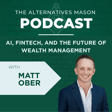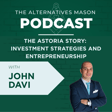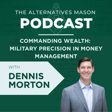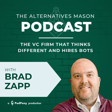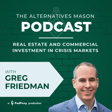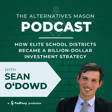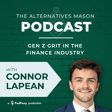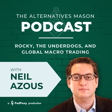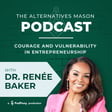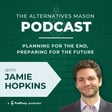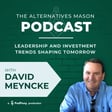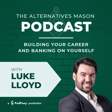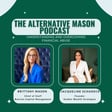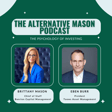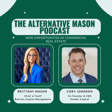
The Alternatives Mason: Building Alts Knowledge Brick by Brick | Episode 18 | Supporting Small Business Through Micro Private Equity featuring Kyle Kuderewski
Welcome to The Alternatives Mason: Building Alts Knowledge Brick by Brick. Banrion Capital Management uses technology to help independent advisors scale and educate themselves on alternative investments. Since education is such a big piece of the Banrion mission and business, we are excited to kick off this series to dive into the nits and grits of the alternatives space. Episode 18 "Supporting Small Business Through Micro Private Equity" features Kyle Kuderewski, Operations Manager with WebStreet (formerly Empire Flippers Capital).
Kyle blends expertise in passive investing, entrepreneurship, and alternative investments. With a background in engineering management and a master's in project management, Kyle offers a unique perspective. Transitioning from the corporate world to WebStreet, Kyle found his niche in online business investing, aligning his goals with the company's vision. As a key figure at WebStreet, he spearheads efforts to make online businesses a viable passive investment option for accredited investors.
Connect with Kyle:
Learn More About WebStreet: WebStreet
Follow WebStreet on 𝕏: @WebStreetLLC
Connect with Kyle on LinkedIn: Kyle KuderewskiLearn More About Banrion: Banrion Capital Management
Follow Brittany on 𝕏: @Brittany_Mason
Follow Banrion on 𝕏: @Banrion_Capital
Subscribe to our YouTube Channel: @BanrionCapital
Important Disclosures:
The opinions expressed on the “The Alternative Mason Podcast” are for general informational purposes only and are not intended to provide specific advice or recommendations for any individual or on any specific security.
It is only intended to provide education about the financial industry. To determine which investments may be appropriate for you, consult your financial advisor prior to investing. Any past performance discussed during this program is no guarantee of future results.
The guests featured on this program are participants on Banrion Capital Management’s platform. As such Banrion may receive payment for their participation as a platform partner.
Any indices referenced for comparison are unmanaged and cannot be invested into directly. As always please remember investing involves risk and possible loss of principal capital; please seek advice from a licensed professional.
Investments are not FDIC-insured, nor are they deposits of or guaranteed by a bank or any other entity, so they may lose value.
Investors should carefully consider investment objectives, risks, charges and expenses. This and other important information is contained in the fund prospectuses and summary prospectuses, which can be obtained from a financial professional and should be read carefully before investing.
Statements attributed to an individual represent the opinions of that individual as of the date published and do not necessarily reflect the opinions of Banrion Capital Management or its affiliates. This information is intended to provide educational value, highlight issues and should not be considered advice, an endorsement or a recommendation.
All Banrion Capital trademarks mentioned are owned by Banrion Capital Management, Inc., an affiliated company or fund. All other company and product names mentioned are the property of their respective comp
